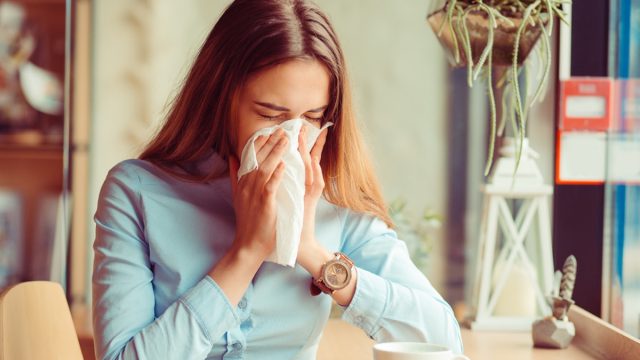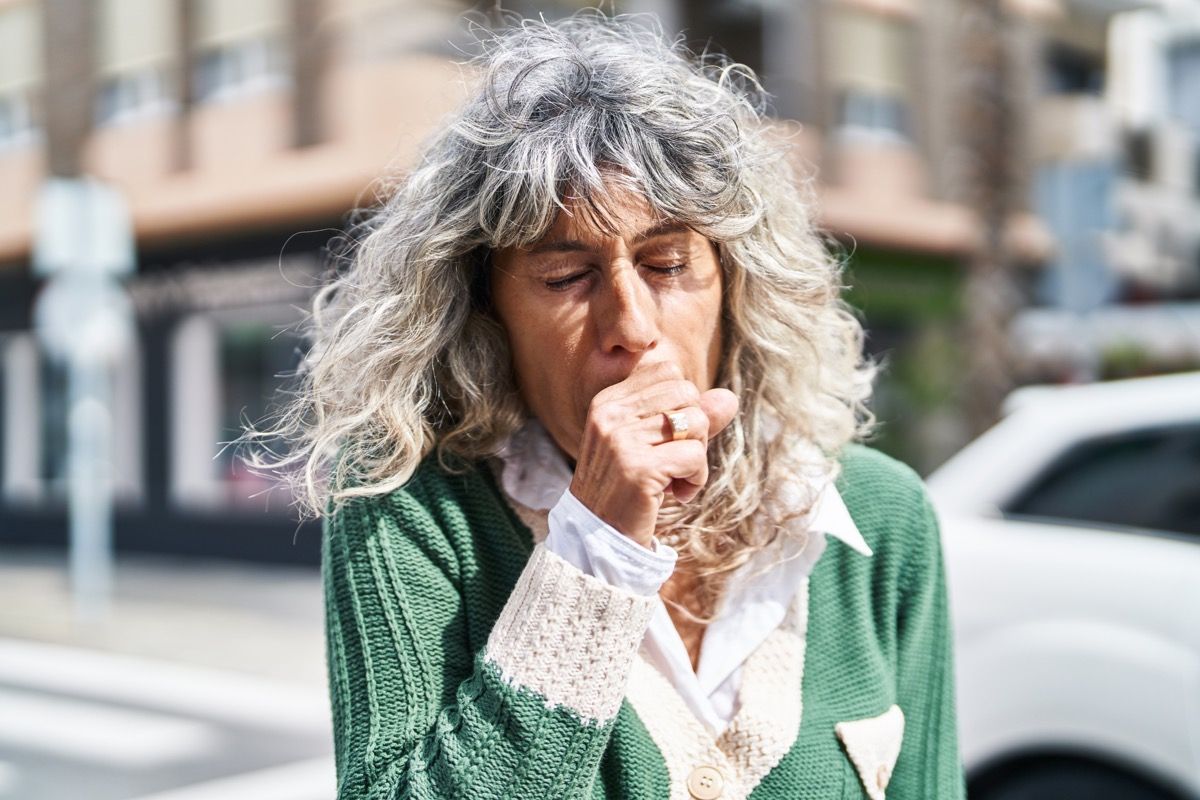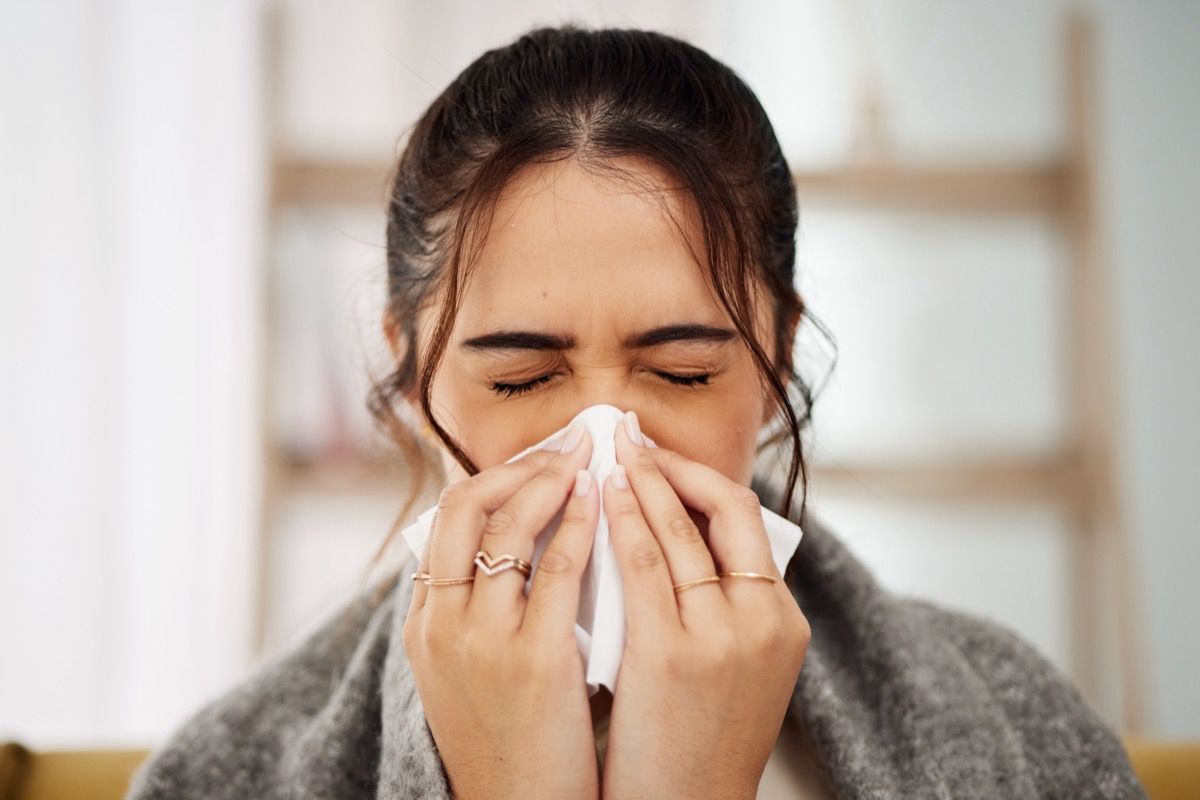7 Symptoms That Are Usually COVID, Not Allergies, Doctors Say

Our emergency response to the COVID-19 pandemic may have ended, but that doesn’t mean we’re necessarily free from its grip. This past week alone, over 17,300 people were hospitalized in America for their COVID symptoms, according to data from the Centers for Disease Control and Prevention (CDC). One of the best things you can do to continue to curb the spread of COVID is to recognize the symptoms, test frequently, and isolate yourself if you do test positive. A discerning eye for the differences between COVID and similarly presenting symptoms from ailments like allergies can help you spot the problem early.
“Allergies and illnesses or infections such as COVID-19 share many similar symptoms, but allergies tend to be chronic and have a distinct pattern, whether that be seasonal or from a specific exposure to an environmental irritant,” explains Robert Biernbaum, DO, Chief Medical Officer at WellNow Urgent Care.
Because many early symptoms of COVID-19 can look very similar to other respiratory illnesses, Biernbaum recommends getting tested as early as possible. He notes that besides stopping the spread of COVID, this also allows patients who meet the medical criteria to be prescribed antiviral treatment within the recommended window, preventing severe illness.
Read on to hear from doctors about the seven symptoms that are more likely to be COVID than allergies.
RELATED: Doctor Reveals the COVID Symptoms That Show Up Before You Test Positive.
1
Fatigue

Fatigue is associated with a wide range of illnesses and ailments, including COVID-19 and allergies, says Christi Wojewoda, MD, FCAP, Chair of the Microbiology Committee for the College of American Pathologists. In both cases, fatigue occurs when the body launches an immune response against an outside threat—either an allergen or virus.
However, she notes that if a feeling of unusual tiredness doesn’t go away, it might be more than just allergies. “COVID-19 fatigue sometimes presents itself as more severe and persistent,” the pathologist tells Best Life.
2
Headache

It’s not uncommon to experience a headache as a result of your allergies. This can occur when the sinuses swell in response to an allergen, preventing drainage and building pressure in the nasal area and forehead. Some migraines are also associated with allergies, according to the American College of Allergy, Asthma, & Immunology (ACAAI).
However, the odds are high that if you have a headache, it’s the result of COVID or another viral illness—especially if it’s not concentrated in your sinuses. Research has found that nearly a quarter of people with COVID experience a headache, and many report it as their first symptom.
“COVID-19 headaches might be accompanied by other symptoms like fever or body aches,” Wojewoda notes.
RELATED: COVID Now Causing These Unusual Symptoms, New Data Shows.
3
Sore throat

Sore throat is another symptom that can occur as the result of both allergies and COVID.
“Sore throats due to allergies are most commonly caused by post-nasal drip, and more commonly occur in the morning,” says Biernbaum. “Unlike a virus, seasonal allergies are a chronic condition so a sore throat due to allergies could last weeks to months. Allergy medications can be used to control or improve these symptoms.”
However, Biernbaum notes that if the sore throat is accompanied by a fever and body aches, or if it came on suddenly over a few hours or a day, this is more indicative of a viral infection. You can expect a sore throat from a virus to last between two and seven days, he says.
4
Loss of smell or taste

During allergy season, many people experience a loss of taste or smell due to nasal congestion. However, more often than not, sudden onset loss of taste or smell is caused by COVID.
“This is a telltale sign. Allergies might stuff your nose, but COVID-19 can take away your sense of smell or taste suddenly, even without a stuffy nose,” says Wojewoda.
RELATED: The Most Accurate Time to Take a COVID Test, New Study Reveals.
5
Cough

Though allergies can cause a cough, Biernbaum says this symptom is also more likely to point to COVID or another viral respiratory infection.
“COVID-19 coughs are usually persistent and accompanied by other symptoms that indicate a viral infection like fever, chills and fatigue. Allergy-related coughs are usually seasonal or triggered by specific allergens in the environment and may be accompanied by symptoms like sneezing and itchy eyes and throat,” he tells Best Life.
RELATED: 4 Best Supplements to Take for Allergies, According to Doctors.
6
Nasal congestion

If nasal congestion is your only symptom, Biernbaum says it’s most likely to be COVID—not allergies.
“Nasal congestion can be caused by allergies or COVID-19; however, allergies typically include additional symptoms such as itchy or watery eyes and sneezing,” he notes. “Nasal congestion caused by COVID-19 is most often accompanied by symptoms like fever, cough, body aches and fatigue.”
7
Fever

Finally, if you develop a fever in addition to any symptoms commonly associated with allergies, this should be your signal that viral infection—not an allergy—is to blame.
“Fever is not a common symptom of allergies. COVID-19, flu, and other systemic viral infections are more likely to cause fever, chills, body aches, headache, sometimes vomiting or diarrhea, which are highly unlikely in allergies,” Biernbaum says.
“Remember, COVID-19 symptoms can vary a lot,” adds Wojewoda. “They might look like other illnesses, including the flu or allergies. If you’re not sure what’s causing your symptoms, it’s important to consult your doctor for evaluation and testing.”
Best Life offers the most up-to-date information from top experts, new research, and health agencies, but our content is not meant to be a substitute for professional guidance. When it comes to the medication you’re taking or any other health questions you have, always consult your healthcare provider directly.